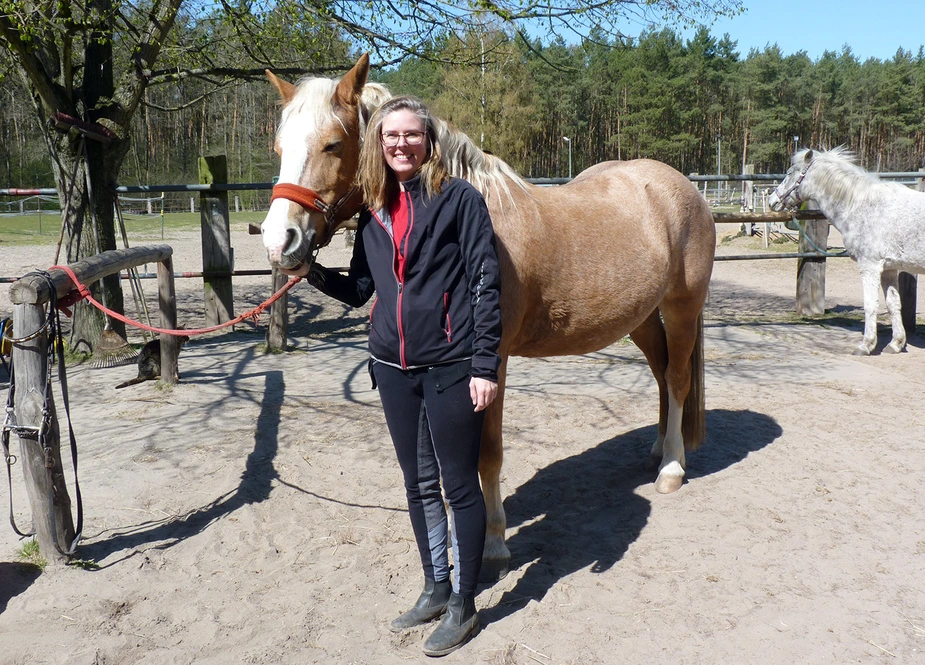In conversation with Yvonne Dertinger, an intercultural trainer
viadrina sprachen GmbH in Adlershof not only conveys language but also intercultural differences
Though language trainers are anything but rare, they are in high demand. Nuances of a language are best taught one-on-one, says Yvonne Dertinger. She has been teaching German as a foreign language for 13 years, and now also offers a course on technical German. Since last year’s May, she has been working for viadrina sprachen GmbH, a subsidiary of the Viadrina European University in Frankfurt (Oder), which has an office in Adlershof. Dertinger studied English, American Studies, Russian, and sociology at Humboldt-Universität in Berlin. Already at school she had penchant for languages and was engaged in something that was commonplace 30 years ago but is now quite rare: she sent hand-written letters all over the world. Years later, the magic of foreign languages and cultures still has a spell on her.
Adlershof Journal: What does viadrina sprachen GmbH offer in Adlershof?
Yvonne Dertinger: In addition to classic language lessons, we offer communication, conflict management and diversity management training, and individual coaching.
What groups are you targeting?
All the vastly different groups that come with a globalised society. Adlershof is a very international location. Many people in the companies and institutes speak English, their products are sold all over the world, people go on international conferences, and go on research stays abroad. German natives want to broaden their foreign language skills, while expats and guest researchers want to learn German, helping them integrate more into society. To be aware of intercultural differences is important to them. This applies to people leading international teams, or salespeople with customers in different countries.
Where does your passion for languages come from?
When I was 13 years old, I saw an ad in the papers for an Ireland-based international letter-writing club. That’s where I got my first 20 contacts. When I was still at school, I used to write all night, mostly in English but a few Russian letters, too. These letters were handwritten, five to ten pages long, with beautifully designed envelopes, and included little presents like postcards, photos, coins, flags. In just a few years I had 40 pen friends all over the world. Some of them I would write to for ten years, some I even met in person. I’m now still in contact with some via Facebook, an American woman that moved to China and an English woman.
Where does the focus on technology come from?
I worked at the Technical University of Applied Sciences Wildau for three years, teaching a module on technical German. During that time, I learned a lot about technology and had to continually come to grips with new work areas and penetrate the jargon. I also learnt a lot from the people in my courses explaining their work and research activities to me.
Do you teach one-on-one or in groups, online or offline?
All of the above. One-on-one teaching is clearly the best because it lets me give my clients all my attention. I am currently coaching a Turkish professor of literature who is preparing for a research presentation in German. We discuss his field to help him find the right words between the lines. Since the coronavirus, digital tutoring has now become very en vogue but I prefer being in the same room with my pupils.
What are your preferred teaching methods?
That depends on a person’s learning style. It’s usually a combination of listening, speaking, and writing. I like to give my clients newspaper articles, or have them read short stories, but I also include hands-on exercises. I once practiced the recovery position with a medical professional, for example. During one lesson, I also remember rolling out a yoga mat. To me, language and movement are one. That’s why I also recommend walking when learning a language. And having flashcards in your pocket to be able to practice anytime.
When did you last try something new?
I received qualification as a trainer for intercultural competence at artop (Editor’s note: institute affiliated with Humboldt-Universität).
What do you do in your spare time?
My now eight-year-old daughter got me back into horse riding three years ago. We are both members in the SG Zeuthen-Wüstemark riding club and share responsibility for horses with others. I share a Haflinger mare and my daughter a German Riding Pony. This means we don’t just ride but also work on the horse farm, including mucking out boxes, grooming and feeding horses, and raking the yard. My other passion is travelling, whether it’s city trips or long-distance. I am also a book hoarder and love to read. I’m mainly into American and English literature – Paul Auster is my favourite – but also read a good amount of non-fiction.
Interview by Sylvia Nitschke for Adlershof Journal
